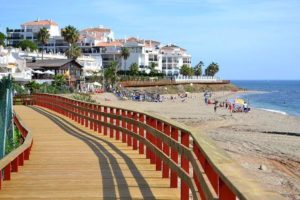Buy a House in Spain – 8 Important Tips
8 Important Tips
To Buy a House in Spain in 2024
1. Find The Right Location
Spain offers diverse regions, each with its own climate, culture, and lifestyle. It’s essential to consider your preferences and needs when choosing a location. Factors such as access to amenities, proximity to work, and lifestyle preferences should all be taken into account.
Different places to choose from
In Spain you can find a wide range of great places to live, each with its unique charm and appeal. Here are some top picks for places to consider living in Spain:
MALAGA
 Situated on the Costa del Sol, Malaga boasts a Mediterranean climate, beautiful beaches, and a lively social scene. The city has experienced cultural revitalization in recent years, making it an increasingly popular choice for expatriates.
Situated on the Costa del Sol, Malaga boasts a Mediterranean climate, beautiful beaches, and a lively social scene. The city has experienced cultural revitalization in recent years, making it an increasingly popular choice for expatriates.
Malaga is best known for its string of popular beach resorts along the Costa del Sol and, although these have their own attractions, the province has much more to offer. Malaga city is a vibrant provincial capital with a fascinating history, while the area of the Costa del Sol to the east of Malaga city, towards Granada, is less developed, and is known as La Axarquia. The Guadalhorce valley area leads from Malaga city to the Northern Malaga province, whose main town is Antequera. In the west are the picturesque mountain ranges and villages of the Serrania de Ronda.
BARCELONA
Located on the northeastern coast, Barcelona is renowned for its stunning architecture, beautiful beaches, and a thriving cultural scene. It’s a city that seamlessly combines modern urban living with a relaxed coastal atmosphere.
VALENCIA
 This coastal city is celebrated for its mix of old-world charm and modern innovation. With its beautiful beaches, charming historic center, and the futuristic City of Arts and Sciences, Valencia offers a high quality of life.
This coastal city is celebrated for its mix of old-world charm and modern innovation. With its beautiful beaches, charming historic center, and the futuristic City of Arts and Sciences, Valencia offers a high quality of life.
The Region of Valencia has a total area of 23,255 km2 and a profoundly Mediterranean landscape with vast coastal plains alternating with striking mountainous areas, in addition to 632 km of coastline so visitors can enjoy the sea and the good climate all year round.
SEVILLE
Seville, the capital of Andalusia, is famous for its rich architectural heritage, traditional flamenco music, and passionate local culture. Its warm climate and historic landmarks make it an attractive place to call home.
MADRID
 As the capital and largest city in Spain, Madrid is known for its rich history, vibrant culture, and bustling nightlife. It offers a cosmopolitan lifestyle with excellent amenities, dining options, and a dynamic arts scene.
As the capital and largest city in Spain, Madrid is known for its rich history, vibrant culture, and bustling nightlife. It offers a cosmopolitan lifestyle with excellent amenities, dining options, and a dynamic arts scene.
SAN SEBASTIAN
Nestled in the Basque Country, San Sebastian is celebrated for its picturesque bay, gourmet cuisine, and world-renowned gastronomic scene. It’s a smaller city with a relaxed atmosphere, making it an appealing option for those seeking a quieter lifestyle.
PALMA DE MALLORCA
The capital of the Balearic Islands, Palma offers a unique blend of history, culture, and natural beauty. With its charming old town, stunning coastline, and vibrant expat community, it’s a popular destination for those seeking a Mediterranean island lifestyle.
When considering where to live in Spain, it’s important to take into account factors such as climate, cost of living, access to amenities, and personal preferences in terms of urban or coastal living. Each of these cities offers its own distinct advantages, so it’s worth exploring to find the best fit for your lifestyle and needs.
2. Seek Legal Help
Seek legal assistance from a professional who understands Spanish property law, as well as the specific regulations and requirements in the region where you plan to purchase. This will ensure that you are fully informed about the process and potential legal implications.
Besides, there is a lot of paperwork involved to buy a house in Spain.
3. Finance
If you require financing, research the available options for non-residents. Understanding the mortgage process and the associated costs is crucial. Additionally, consider currency exchange rates if you are transferring money from another country.
4. Property Inspection
Before finalizing the purchase, it’s advisable to have a thorough inspection of the property conducted by a qualified surveyor. This inspection should cover structural integrity, potential issues, and compliance with local building codes.
5. Residency and Tax Implications
If you plan to spend an extended amount of time in Spain, it’s important to understand the residency and tax implications of owning property there. Seek advice from a tax professional who specializes in international tax law.
6. Language and Culture
Familiarise yourself with the local language and customs. While many people in Spain speak English, especially in popular expat areas, knowing some basic Spanish can greatly enhance your experience and interactions with locals.
7. Real Estate Agents
Consider consulting with a reputable real estate agent who has experience working with international buyers. A knowledgeable agent can provide valuable assistance and help navigate the complexities of the Spanish property market.
8. Quality of Life
Beyond the property itself, consider factors such as healthcare, education, and recreational opportunities in the area. Evaluating the overall quality of life in the community is crucial for a satisfying long-term investment.
Remember, buying a house in a foreign country can be a rewarding experience, but it requires careful planning and consideration. I hope these tips help you as you navigate the process of purchasing a home in Spain!
Expat Agency offers Free and Full Buying Assistance in Spain
Click To Know Further About This Exclusive Service
We will be glad to assist you with this.















